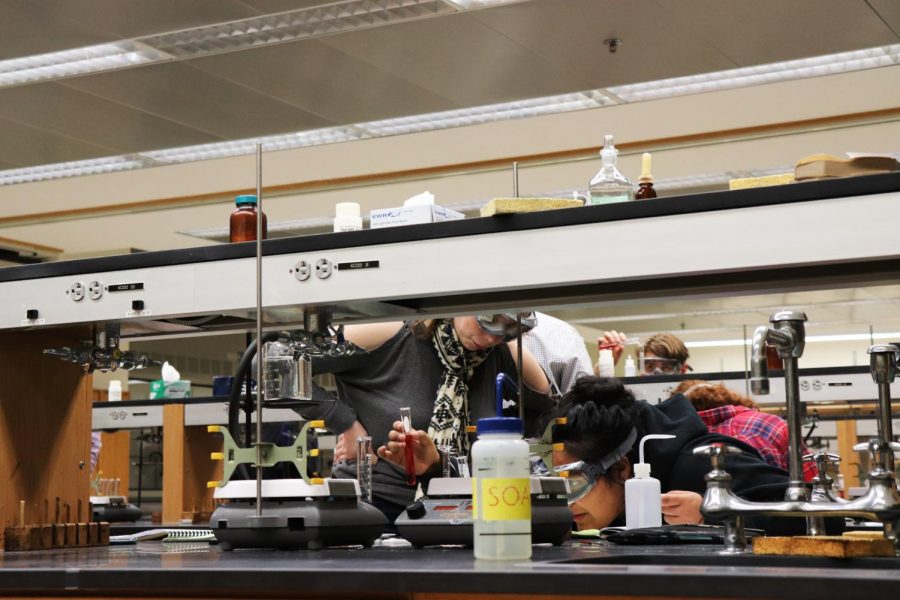Office of Undergraduate Research Provides Unique Opportunities for Students
Students in a lab in the Science Center. The Office of Undergraduate Research supports students who hope to pursue faculty-guided research.
The cornerstone of many students’ undergraduate careers is the opportunity to pursue independent research while guided by faculty members who are experts in their fields. The Office of Undergraduate Research offers a variety of programs and events that support faculty-assisted student research, and is currently accepting abstracts through March 8 for the Undergraduate Research Symposium, which will take place May 1–2.
Associate Professor of Neuroscience Leslie Kwakye, OC ’06, took over the office as its new director last June. In addition to supporting overall undergraduate research, Kwakye works to ensure equitable access to research opportunities for students whose backgrounds are historically underrepresented in academia.
“The thing that really sets schools like Oberlin apart is the fact that undergraduates cannot just get involved in research, but can get involved on a project and be the main person on the project,” Kwakye said. “They can take ownership of the project.”
One of OUR’s notable programs is the Mellon Mays Undergraduate Fellowship, a two-year program in the social sciences and humanities that prepares traditionally-underrepresented students for Ph.D. work after Oberlin. Assistant Professor of History and Comparative American Students Tamika Nunley is the program’s faculty coordinator.
“The Mellon Mays program is part of the Mellon Foundation that supports students who are interested in venturing into those careers, in getting the professional development resources that they need to navigate that career, because it’s really challenging being someone who is underrepresented in institutions of higher education,” Nunley said.
Nunley believes that OUR’s mission is critical to the success of undergraduate research at Oberlin.
“I think that undergraduates at Oberlin are always going to do research just because that’s how they are wired,” Nunley said. “I think that we can provide support and assistance for those goals in ways that are more effective if there is a hub that they can go to get the resources they need, and faculty mentors, and financial and summer resources — also equipment resources, and just having a space where they can be around other like-minded undergraduates who are interested in doing research.”
OUR also sponsors the Science and Technology Research Opportunities for a New Generation program. STRONG is a summer program for incoming first-years that helps them establish relationships with mentors, build community, and gain research experience before they start at Oberlin. This year, OUR is working to expand STRONG through additional programs, a larger cohort, and a residential experience called Roots in STEM.
College second-year Natalie Soord participated in STRONG and worked in a geology lab before starting her first semester. Soord felt that the program not only gave her research experience, but also helped her form a community with her cohort before starting the academic year.
“It was nice to have a group of support,” Soord said. “You also live in the same hall as your cohort the first year as part of the contract. So we were all neighbors, and a lot of us took the same STEM classes, so we would all support each other.”
A key part of STRONG is connecting students to mentors. OUR works with both students and faculty to develop mentoring skills to support underrepresented students participating in STEM fields.
“Early research for the students is really important,’’ Kwakye said. “It contributes really strongly to a student’s future success in STEM or future persistence in STEM. And the early connection to a mentor or establishing a mentoring relationship early in a student’s time at an institution is especially important for keeping students in STEM.”
OUR also has two other cohort-based programs, one of which is the Oberlin College Research Fellowship. OCRF supports students and their mentors as they conduct research over two summers.
Kwakye encourages students to pursue their own research in the areas that they are interested in. The best place to start is a conversation with their faculty advisor, who can guide students toward meaningful research opportunities. OUR can also support students in finding and building a relationship with mentors.







